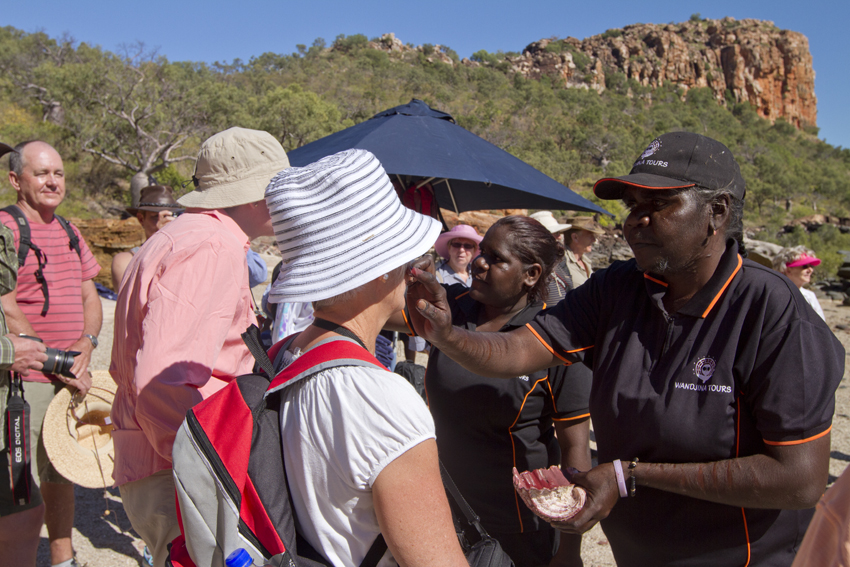
Mitzy Oobagooma and Robyn Mungulu painting visitors with ceremonial ochre
Aardbulaardoo Ngaieye: Welcome everyone to Dambeemangarddee Country!
“Through our law we have cultural responsibilities to look after people when they visit our country,” Y Woolagoodja, Dambimangari Elder. This includes the security of important cultural sites, the welfare of our plants and animals, and your safety as visitors. We ask that you follow our Code of Conduct to ensure the preservation, safety and enjoyment of Country and Culture for future generations. “We would like all people to respect us and ask permission to come to visit us and our country. We welcome visitors who really want to know,” J Oobagooma, Dambimangari Elder.
Dambimangari Visitor Code of Conduct 2023
Tread Lightly & Leave No Trace
- Please preserve our coast and allow others a sense of remoteness by removing everything you bring to country. This includes all vegetable peel and seeds and cigarette butts.
- Freshwater sources are precious, scarce, and often sacred. Please take care not to wash with soaps or detergents in freshwater streams or waterholes as these sites may become contaminated.
- Please don’t paint (this includes using mud) or engrave names or graffiti.
- Please don’t create any cairns or similar markers or move any stones or objects.
- Please do not collect any living or dead plant or animal specimens.
- No human waste to be deposited, buried or not, on Dambeemangarddee country.
- Stay on established trails where they exist and avoid creating new trails when walking through country.
Respect Cultural Sites & Access Restrictions
- Our country is full of sacred sites, please respect them.
- Avoid all burial places and stone arrangements.
- Do not touch, move or collect cultural objects, shells, artefacts, skeletal material or rocks.
- Take care when viewing Dambeemangarddee art sites. Brushing against, touching, or graffiti can cause significant damage to cultural art sites.
- Please do not take photos, film or reproduce images in any media form for commercial purposes or social media.
- Due to cultural reasons, some cultural sites may be closed from time to time. Please check the DVP Visitor Pass Location Schedule on the Dambimangari website and respect our cultural protocols and access restrictions.
Protect Kimberley Wildlife
- Let wildlife feed themselves.
- Keep your eyes out for weeds, seeds and pests.
- Report any cane toad sightings on islands to DAC (our islands are important safe havens for native animals)
Come prepared & be safe
- Be prepared for powerful currents and tides (10m+ variation)
- Be Crocwise – No swimming in saltwater or estuarine areas or freshwater streams near the coast as saltwater crocodiles can locate to inland streams.
- Avoid heatstroke in a harsh climate – always wear sturdy enclosed shoes, a hat & sunscreen.
- Carry enough water for your return journey.
- Beware of wild cattle
- There are risks of rock falls and loose surfaces – do not approach cliff or gorge edges.
Protect Our Country
- Camping is not permitted anywhere on Dambeemangarddee Country, including beaches
- Please report any damage or concerns seen on country to Dambimangari Aboriginal Corporation (DAC) as soon as practical
- Dambeemangarddee country should be preserved for current and future generations.
Remote Travel – Safety First
- No medical, food, fuel or mechanical repair facilities are available.
- Prepare a Trip Plan, let someone know where you are going, and check in
- No wi-fi, internet or mobile services are available. Please ensure you have downloaded your permit prior to your travel.
- Make sure you are self-sufficient, even in the case of emergency. Carry emergency locator beacons, EPIRB, and satellite phone.
- In the event of emergency, the cost of responding will be borne by you. Make sure you have insurance. Legal action may be taken to recover expenses.
- We strongly recommend that you do not travel alone.
Fires
- Camp/cooking fires are not permitted on Dambeemangarddee country.
- Dambimangari Rangers conduct aerial and on-ground early dry season burning from April to June each year to reduce wildfire damage and greenhouse gas emissions.
- Visitors should heed fire operations notices and avoid travelling during this period.
- Lighting a fire on Dambimangari Country for any purpose whatsoever is strictly prohibited to avoid the risk of wildfire.
Thank you for helping us promote respectful, culturally appropriate access and look after our beautiful country for future generations!